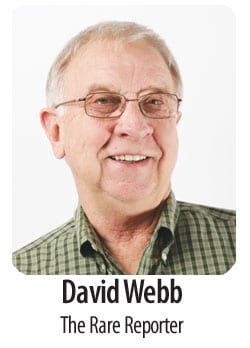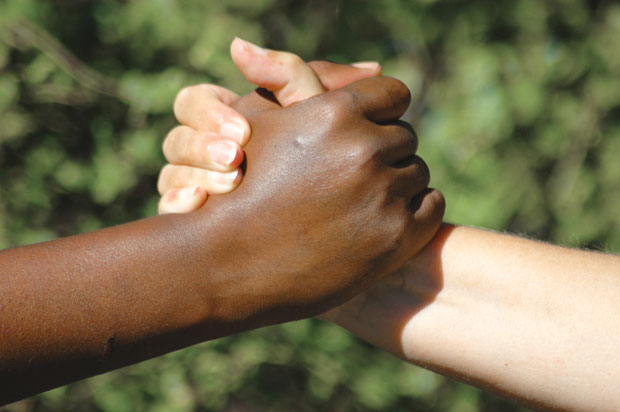Violence and nationwide protests in the wake of a Missouri grand jury’s decision not to indict a white police officer for the shooting death of a black teenager in August reveals the depth of the racial divide in this country and the distrust of our criminal justice system.
Despite weeks of preparation by government officials and civic leaders to avoid a riot, the St. Louis suburb of Ferguson erupted in a street war Nov. 24 as mostly black protesters set fire to buildings and police cars, broke business windows, looted stores, fired guns and threw bottles and rocks at police officers, firefighters and reporters. The deployment of smoke and tear gas by law enforcement officers and the presence of
National Guard troops failed to quell the civil unrest.
A shocked nation watched live coverage of the chaos on network television stations.
Soon after St. Louis County prosecutor Robert P. McCulloch announced the grand jury rejected any indictments against Ferguson policeman Darren Wilson, hundreds standing in front of the Ferguson Police
Department began yelling insults and pelting a line of police officers standing guard with various objects.

The destruction escalated during the night after the tearful breakdown of Michael Brown’s mother who cried that the grand jury of nine whites and three blacks denied her “justice” for the shooting of her 18-year-old son on a residential street. Brown’s stepfather jumped up on a platform with his wife, embracing her before he turned to the crowd and began yelling, “Burn this motherfucking place down.”
In St. Louis protesters blocked traffic on Interstate 44, and Lambert-St. Louis International Airport suspended flight traffic as a precaution against automatic gunfire striking airplanes. The fires burned through the night because of fears firefighters might be shot by protesters and the inability of law enforcement officers to control the situation.
Although accustomed to violence and riots, many Americans feel they witnessed a night of mayhem in Ferguson like no other one before it.
Only a small percentage of Ferguson’s black population participated in the rioting, but their community as a whole will suffer from the actions of the agitators. Black business owners experienced significant losses, and the community lost service and shopping venues.
Now, protests continue in cities nationwide, and arguments on social media sites such as Facebook flourish between advocates of law enforcement officers and activists who view the killing of Brown as an act of police brutality.
Civil rights leaders urge calm and lawful behavior, but the debate continues to rage about whether a police officer executed a teenager suspected of stealing tobacco products on Aug. 9, or if he justifiably shot an assailant who threatened his life with his fists and bulk. The police officer said the teenager refused to obey a command to get out of the street and walk on the sidewalk.
Further exacerbating the national tension, a New York City grand jury on Dec. 3 no-billed a police officer who strangled a 43-year-old black man with a chokehold when a group of policemen attempted to arrest him in July for the illegal sale of cigarettes on a Staten Island sidewalk. Thousands of people marched in the streets to protest that evening in a more peaceful assembly, but unrest across the nation began to brew over the new development.
Many prominent members of the LGBT community and their friends have joined both sides of the debate. Hostile arguments frequently break out, followed by “unfriending.” The video of Brown strong arming a store clerk and carrying unpurchased merchandise out of the door minutes before he came into contact with the policeman leads many to view him unsympathetically. They perceive him as a bully whose actions led to his own death.
The protesters’ rioting reinforces biases some have against black people as a whole. Others fear the start of a race war in the nation, and they blame the media’s coverage of the protests for exacerbating the situation.
Southern Poverty Law Center President Richard Cohen writes in an editorial that observers should not be second-guessing a grand jury that had access to voluminous information about the events leading up to Brown’s death. He attributes the protesters’ distrust of police officers to “a gulf that’s been formed by the history of discrimination in our country, a gulf that has been deepened by the systemic biases in our current criminal justice system.”
Cohen speculates the nation will likely experience more disastrous instances of civil unrest until there is reform to the criminal justice system and a healing of the racial wounds of the past that created the racial division. “It’s a gulf that breeds suspicion and mistrust, a gulf that undermines the very legitimacy of our system of justice,” he said.
Meanwhile law enforcement officers fear a pattern of resistance to authority might begin developing that could interfere with their ability to maintain order. Wilson has resigned from the Ferguson Police Department with the knowledge that his law enforcement career is over.
Ferguson’s Police Chief Tom Jackson vows to remain at the helm of the police department, and he is promising to recruit more black police officers and increase sensitivity training for the predominantly white police force working in a majority black community. Plans are also underway to install body cameras on all police officers so there will be a video recording of all law enforcement interactions.
All of the administrative solutions being examined by government officials on the local, state and national levels have merit. But ultimately it will require participation by all citizens in an effort to obey the law and respect each other regardless of their cultural differences for our nation to resolve this internal conflict.
Reporters who cover crime and examine police reports know that law enforcement officers witness and must contend with the types of violence that the average person cannot begin to comprehend. Often, it arises unexpectedly, and anyone coming into contact with police officers should be considerate of their apprehension.
It is a tragedy that Brown died as the direct consequence of a relatively minor crime. But the violence that ensued during the riots is inexcusable. All groups of people need to give a little, try to understand each other better and even extend a helping hand to the disadvantaged. The underprivileged need to try harder to improve their lot through education and hard work.
More importantly, cooler heads need to prevail. We face too many threats from beyond our borders to be fighting with each other.
David Webb is a veteran journalist with more than three decades of experience, including a stint as a staff reporter for Dallas Voice. He now lives on Cedar Creek Lake and writes for publications nationwide
This article appeared in the Dallas Voice print edition December 5, 2014





